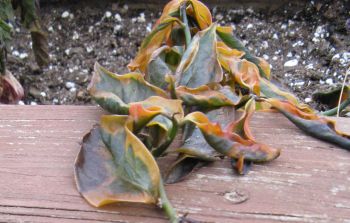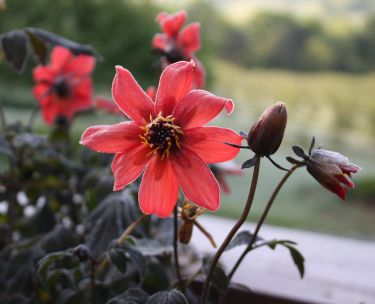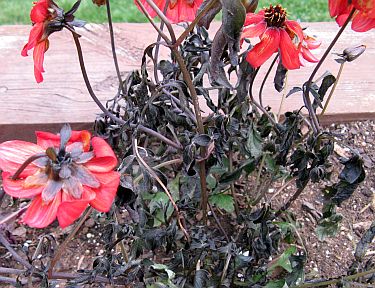We all play the game – at least the more impetuous among us do. You sneak a few tender things out into the garden, or on to the patio. When the temperature drops and there’s a frost warning, no problem…just cover them up or bring them in.
Unless you forget.

This WAS a rare and neato Pereskia aculeata ‘Variegata’. Paul W., please send me another…
Before dawn on Monday morning, (May 9) the temperature on our little mountainside dropped below freezing for four hours, going as low as 29.5 F according to our weather station. I had tucked everything back into the greenhouse or up under the eaves…except for the contents of a built-in planter on a far outpost of our deck.

Dahlia Mystic Desire, edged in frost at 7:00 a.m., May 10.
NOAA has a handy set of maps that illustrate last dates of “Spring freeze occurrence”. The maps present data averaged between 1951 and 1980.
Walking around the garden last evening with a nice hot cup of martini, I surveyed the damage. Big, juicy-stemmed bleeding hearts that seem so fragile and succulent? Not a speck of injury – but they’ve been up since March. Newly emerged (and really expensive) Asian Jack-in-the-pulpits looked like wet rats. Annuals and tropicals exposed out in the open didn’t stand a chance. Early-to-leaf-out trees can take a beating, too. Japanese maples are notoriously precocious, flinging their fabulous foliage out as much as 45 days prior to last frost here. They’re in pretty good shape now, having acclimated a bit. But for our previous hard frost,15 days ago, we had eight little maples individually draped in white row cover (looked like Halloween).

Dahlia Mystic Desire, kaput at 7:00 p.m., May 10.
So why the damage on some and not others? Plants differ in the amount of sugars, proteins, and other compounds that affect the osmotic potential in cells. The lower the content of these compounds, the more likely freeze damage will occur. Young and unacclimated tissue tends to have a higher ratio of water. Like an overfilled water bottle stuck in the freezer, something’s got give as the liquid crystallizes and expands (vast oversimplification, sorry). Cells burst, or are crushed from the freezing of intracellular water, and fluid goes everywhere – hence the limp, dark, water-soaked appearance.
Fog or dew on the plant can delay injury; as external moisture freezes, in gives off heat (an exothermic reaction; one of the amendments to the Laws of Thermodynamics), until all the water is frozen. This is why citrus groves are continually sprayed with water during a freeze event. So it also depends on the duration of the cold; if temperatures just briefly drops below freezing, damage is minimal. Four hours for non-acclimated tissue? See the grim photos for results. Will I wait until May 15 to plant stuff out next year? Absolutely, positively, not. We’re due a no-late-frost spring!
Ouch! I would have thought your cold air drainage was better than that. I wonder how cold it was by the creek!
Your Pereskia may come back from the stem base, but I’ll set aside a new one for our next visit anyway.
One of my co-workers has a theory that it’s always coldest just before the sun comes up because the sun hits and therefore heats the air first which starts updrafts which makes things colder. I thought it was because the last minute before the sun comes up is also the longest since it last warmed that particular piece of earth. What’s the real answer?
I believe the temperature actually drops after sunrise due to the suns rays warming the air first and causing the evaporation of moisture in the air. The resulting effect is a quick dropoff of temperature which continues for about an hour. Once the sun heats the air sufficiently, the temps will begin to rise again since the earth is no longer losing heat to the atmosphere. It sounds less complicated in my head than that. It is a wierd concept to express in words.